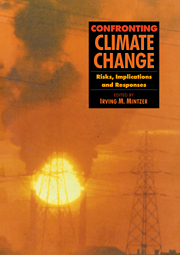Book contents
- Frontmatter
- Contents
- Foreword
- Acknowledgements
- List of Reviewers
- 1 Living in a Warming World
- I The Science of Climate Change
- II Impacts of Global Climate Change
- III Energy Use and Technology
- IV Economics and the Role of Institutions
- 15 The Economics of Near-Term Reductions in Greenhouse Gases
- 16 “Wait and See” versus “No Regrets”: Comparing the Costs of Economic Strategies
- 17 International Organisations in a Warming World: Building a Global Climate Regime
- 18 Modifying the Mandate of Existing Institutions: NGOs
- 19 Modifying the Mandate of Existing Institutions: Corporations
- 20 International Trade, Technology Transfer and Climate Change
- V Equity Considerations and Future Negotiations
- Annex I
- Annex II
- Glossary
- Index
18 - Modifying the Mandate of Existing Institutions: NGOs
Published online by Cambridge University Press: 06 January 2010
- Frontmatter
- Contents
- Foreword
- Acknowledgements
- List of Reviewers
- 1 Living in a Warming World
- I The Science of Climate Change
- II Impacts of Global Climate Change
- III Energy Use and Technology
- IV Economics and the Role of Institutions
- 15 The Economics of Near-Term Reductions in Greenhouse Gases
- 16 “Wait and See” versus “No Regrets”: Comparing the Costs of Economic Strategies
- 17 International Organisations in a Warming World: Building a Global Climate Regime
- 18 Modifying the Mandate of Existing Institutions: NGOs
- 19 Modifying the Mandate of Existing Institutions: Corporations
- 20 International Trade, Technology Transfer and Climate Change
- V Equity Considerations and Future Negotiations
- Annex I
- Annex II
- Glossary
- Index
Summary
Editor's Introduction
For the last 20 years, non-governmental organisations (NGOs) have played a key role in bringing environment and development issues to the attention of policy makers and business leaders. Many of today's environmental NGOs trace their roots to the international movement which formed at the beginning of this century to protect wildlife and wildlands. But over the decades, the purview and interests of these organisations, and their successors, expanded. Today, environmental NGOs are active in more than 100 countries, working on a broad range of issues affecting human health, natural ecosystems, and sustainable development. They concern themselves, for example, with toxic wastes, pesticides, water quality, air pollution, and the environmental impacts of energy supply and use.
At the same time, development-oriented NGOs are active in many Third World countries, and in some industrialized countries as well. They principally focus their attention on the rate, quality, and equity of economic development in the South; and on the economic and foreign policy dynamics of North-South relations. In the last several years, with positive effect, development NGOs have made common cause with environmental organisations to address common issues. The risks of rapid climate change, which endanger natural systems and threaten to undermine the prospects for economic growth, are often the starting point for this new commonality of purpose.
In this chapter, Dubash and Oppenheimer trace the historical development of NGOs, and the linkages between them, in industrialized and developing countries. Using case studies of the Narmada movement in India, the Green Forum in the Philippines, and the Kenya Energy and Development Organisations (KENGO), as well as specific examples from popular campaigns around environmental issues in industrialized countries.
- Type
- Chapter
- Information
- Confronting Climate ChangeRisks, Implications and Responses, pp. 265 - 280Publisher: Cambridge University PressPrint publication year: 1992
- 2
- Cited by

